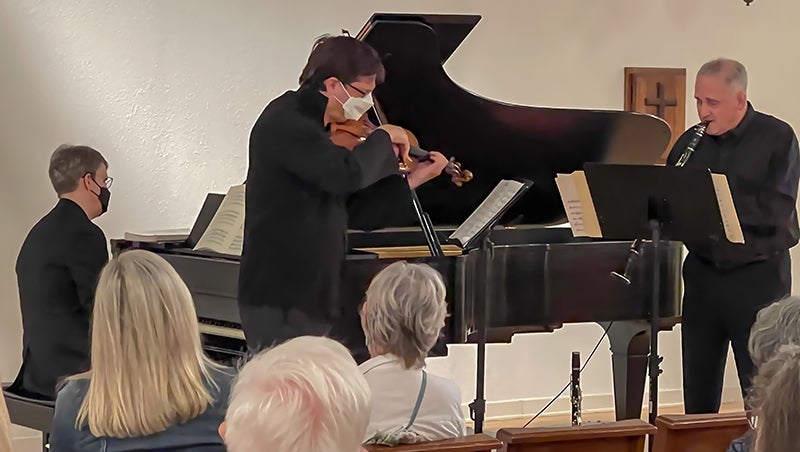Four Seasons Chamber Music Festival: An unforgettable evening of music
Published 6:51 am Wednesday, April 27, 2022

- Sponsored by the Don and Catharine Bryan Cultural Series, the Four Seasons Chamber Music Festival perform music for a clarinet trio, with Thomas Sauer on piano, Alan Kay on clarinet and Four Seasons founder violinist Ara Gregorian. Courtesy Bryan Cultural Series
|
Getting your Trinity Audio player ready...
|
By Kip Tabb
Thank you, Four Seasons Chamber Music, for an unforgettable evening of music Friday before last. Challenging, inspiring and played with a flair and style that truly made the music seem alive, the performance was one of the finest that we have seen on the Outer Banks.
Although the musicianship of the trio – clarinetist Alan Kay, pianist Thomas Sauer and founder and artistic director of the four Seasons Chamber Music series violinist Ara Gregorian – is what made the evening possible, it was the musical selections that elevated an evening of extraordinary musical talent.
Spanning four centuries of musical composition from the works of Beethoven to Jeff Scott’s 2011 Toccata, the evening the evening took the audience on a 325-year journey through musical concepts.
The journey began with Bela Bartok’s Romanian Folk Dances, Sz. 56.
Although there are six movements to the composition, Bartok envisioned this as a fast moving, short piece of music, each movement a suggestion of Romanian folk dance. The piece is unmistakably Bartok – the haunting sounds of the folk music he loved creates a consistent theme that binds the music together.
The music comes to an end with the final movement – Maruntel, a quick dance that seems to almost pit the piano and violin in a competition to see who can reach the end first.
After that Beethoven’s Piano and Violin Sonata No. 2 in A Major, Op. 12 #2 becomes a calm before the storm.
One of his earlier compositions (probably 1798), the piece has the melodic power that Beethoven is noted for, but some of the features that are so much a part of his later works are either not in this sonata or play relatively minor roles. The dissonance that so often marked his later works, does not appear until the third movement, Allegro piacevole; even in that third movement, it is not the focus, but is rather an element of the melodic theme.
That first Bartok piece, that quick Romanian Folk Dances, and the Beethoven Piano and Violin Sonata may all have been preludes to the Contrasts for Violin, Clarinet and Piano, Sz 111 by Bartok.
Composed in 1938 for Benny Goodman, the trio performed the third movement, Sebes.
Checking a translation for Sebes from Bartok’s native Hungarian, the words, “fast, hurtling nimble-footed…” appear. And that is how the piece begins.
A quick plaintive violin cry begins the journey, with a following voice from the clarinet, and suddenly the music is off to places unexpected and challenging. My personal notes on the piece include the word “fearless” and that is, perhaps, what is needed to perform music this complex and challenging.
Rhythms and meters change – seemingly at random. There are passages of surpassing lyrical beauty, and other passages that create the sound of Goodman’s jazz clarinet virtuoso.
There is this wonderful feeling throughout, that the trio is walking to an edge, tiptoeing to the precipice, yet never falling off. It truly takes musicians of the skill and vision of Sauer, Kay and Gregorian to pull it off.
After a brief pause, the second part of the program began with Chopin’s Piano sonata No. 3 in B Minor, Op. 58., Finale: Presto non tanto.
The performance by Sauer highlighted how complex yet beautiful a piece of music this is. It almost seemed at times as though his left and right hands were playing two different themes and meters.
As beautiful as Chopin’s music may be, the highlights of the second part of the evening were the 20th to 21st century composers.
Paquito D’Rivera is still very much with us and his Contradanza is a marvelously joyous Caribbean jazz influenced piece. D’Rivera is a Cuban born clarinetist whose music highlight the sounds of his native country.
Contradanza is typically played by a small jazz ensemble, but with Suauer on piano and Kay clarinet, the music was magic.
The same is true for Astor Piazzolla’s Oblivion.
An Argentine composer, Piazzolla revolutionized how the tango could be described musically. His Oblivion, is a slow tango – ideal for a clarinet and piano. Dark and brooding, the piece was featured in the Italian movie Enrico IV, depicting a man who lives in modern times but believes he is the Holy Roman Emperor Henry IV.
Insuring that the evening doesn’t go too far down the rabbit hole of dark and moody music, 21st century composer Jeff Scott’s Toccata for Clarinet and Piano is a wonderful blend of classical arpeggios blended with jazz motifs. Although his primary instrument is the French horn, Scott has a long history working with jazz and dance ensembles and that rhythmic understanding is at the core of Toccata.
The signature piece of the evening may have been Suite for Clarinet, Violin and Piano by Alexander Arutiunian, a Armenian-Soviet era composer. Composed in 1992, the Suite begins with a slow, perhaps melancholy piano and violin duo. Tension builds between the two and when the clarinet enters the melody seems to soar over the musical themes. Finally clarinet, violin and piano work together to create a building tension leading to the Scherzo second movement.
The music is haunting, lyrical and unforgettable. Arutiunian uses the instruments to create an entire story – there’s joy, there’s sadness, a dialogue between clarinet and violin in the third movement. It all seems to come together in the Finale, with its rhythms and melodies that suggest the joy of dance.
Next up for the Bryan Cultural Series is Anthony Kearns, Irish Tenor, Sunday, May 1 at St. Andrews by the Sea Episcopal Church in Nags Head. Tickets available on the Series website and at Downtown Books in Manteo, Sea Green Gallery in Nags Head and Gray’s in Kitty Hawk.
For more information about the Bryan Cultural Series and to find more information about the Four Seasons Chamber Music Festival event, visit bryanculturalseries.org.
Substantial support for this cultural offering of events is provided by TowneBank of Currituck, OBX Chevrolet Buick, Ramada Plaza Hotel of Kill Devil Hills and Hilton Garden Inn of Kitty Hawk.
The Bryan Cultural Series is a non-profit organization formed in 2012. The board of directors is composed of nine community leaders dedicated to offering a series of high quality cultural events. These events will include a variety of visual, literary and performing arts. The board strives to glean from talent that has attained regional as well as national recognition to maintain a high standard.





